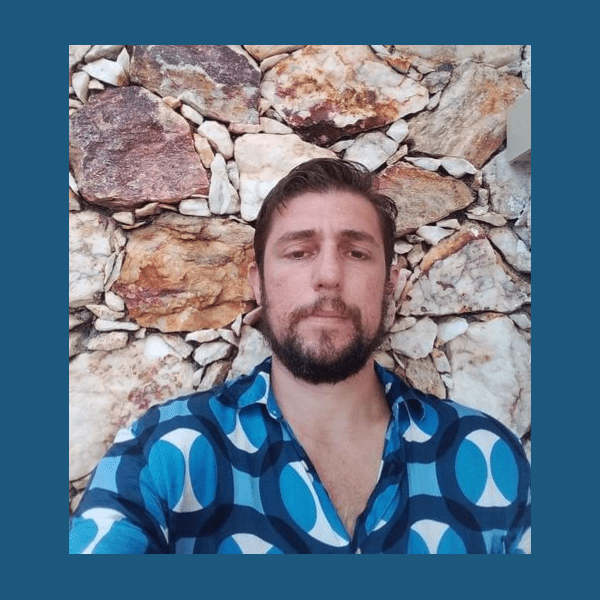Arturo Desimone (1984) Nació en la isla de Aruba (Mar Caribe, Antillas del reino holandés) en una familia de exiliados de Argentina, Polonia y Rusia. Sus poemas, ensayos y cuentos en inglés han sido publicados en diversos jornales literarios en Estados Unidos, el Caribe e Inglaterra (Drunken Boat, New Orleans Review, Matter Monthly, Small Axe, Excéntrica). Cartas a Carlos Marx y otros poemas, poemario bilingüe, fue publicado en 2017 por la editorial peruana Hanan Harawi y se presentó en Cuba durante el “Encuentro de Jóvenes Escritores de Ibero-América y el Caribe” en la Habana. Éste año ha aparecido una edición bilingüe del libro La Amada de Túnez con la editora argentina Clara Beter. La traducción que ofrecemos es de Diego Alfaro Palma.

CARTA A MARX UNO Marx no te escribo como Roque Dalton pudo, llamándote un poeta por tus asexuadas neoplatónicas baladas dedicadas a Jenny von Westphalen Roque al menos era un poeta que escribió sobre tu gusto por los brazos rechonchos y las tetas de Jenny (Por las lecherías de Renania donde el fantasma del primer atacante a la ética del trabajo como el tú flojo leyendo Schlegel junto al río donde los señores feudales aplastaron los levantamientos campesinos de los primeros revolucionarios protestantes, traicionados por Lutero tu laúd no los vengó a ellos tampoco, eran campesinos no trabajadores industriales Te viste a ti mismo en el río, la barba aún no tan larga, no viste la calavera al fondo en la que la serpiente de agua habitaba) Roque conocía algo de la carnalidad divina y esplendida como Rubén Darío, quien no nació tan lejos de donde Roque fue ejecutado por sus propios camaradas de armas. Desearía que hubieras mencionado a la sirvienta en la bodega pagada por el padre de Friedrich Engels el apareamiento contrae una especie de dialéctica — para mí la fertilidad no es puramente material. CARTA A MARX DOS Karl, comenzaste tu último trabajo sobre la estética, prometiste en tus cartas “que sería lo mejor de todo” a Engels le dijiste “no has visto nada aún” pero moriste por la bebida, la sirvienta, cigarrillos luego del primer párrafo. Brecht lo interpretó para ti, en su especial y pragmática forma alemana, Nunca escribir con el estomago vacio, Comúnmente me levanto y escribo poemas por la mañana mientras siento hambre. alternando perder la semilla y la vitalidad de los fantásticos amantes que vi en las vacaciones en Polonia después de eso termino este poema, o me arriesgo a seguirlo, estoy lejos de la panadería para comprar el almuerzo- un deslenguado e irracional eslavo soy, olvido comprar pan, los problemas prácticos son Hidras, no resuelvo el problema hasta que Marx me diga que necesito ser racional, la revolución de los esclavos no tiene magia o sinos o cualquier tipo de fantasía científica catalogada por Dvorak. LETTER A MARX ONE Marx I do not write to you as Roque Dalton would, calling you a poet for your sexless Neoplatonic ballads to Jenny von Westphalen Roque at least was a poet who wrote of your yearning for the fat arms and mammaries of Jenny (\by the Rhineland milkfarms where the ghost of the work-ethic first assailed you as you lazed reading Schlegel by the river where feudal landlords crushed peasant uprisings of the first revolutionary protestants, betrayed by Luther your lute did not avenge them either, they were peasants not industrial workers. You saw yourself in the river, beard not long enough, you did not see the skull at bottom in which the watersnake lived) Roque knew some divine and splendid carnality as Ruben Dario, who was born not far from where Roque was executed by his own troop comrades. I wish he had mentioned the maid in the wine-cellar paid by Friedrich Engels’ father the mating act involves a kind of dialectic– to me fertility is not purely material. Karl, you began your final work of aesthetics, you promised in your letters “this will be the best ever” to Engels you said “you ain’t seen nothing” but died from drink, maid, cigars after paragraph one. Brecht interpreted it for you, in his own special, Germanic pragmatist way, Never write on an empty stomach Usually I wake up and write poems in the morning while hungry, alternative to losing seed and vitality to fantasy lovers I saw on Polish vacations therefore before I finish this poem, or dare continue it, I am off to the baker to buy lunch— irrational tongueless Slav I am, I forget to buy bread, practical problems are Hydras and I don’t solve the problem until Marx tells me I need to be rational, the slave revolt cannot have magic or fates or any such fantasies scientifically inventorized by Dvorak. Traducción:. Diego Alfaro Palma


